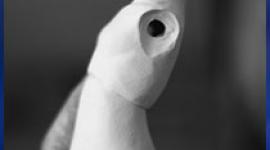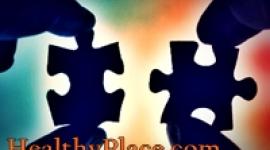How Do I Begin Recovering From My Eating Disorder?
The most professional and accurate answer to "How do I begin?" in my opinion is, "It depends."
 It depends on what form the eating disorder takes, how entrenched it is, what kind of social supports are available, how accessible the person is to deep psychological learning, how much commitment there is, how willing and genuinely informed the person's intimates are, the quality of eating disorder therapy available, the quality of programs available and what touches an individual's heart.
It depends on what form the eating disorder takes, how entrenched it is, what kind of social supports are available, how accessible the person is to deep psychological learning, how much commitment there is, how willing and genuinely informed the person's intimates are, the quality of eating disorder therapy available, the quality of programs available and what touches an individual's heart.
The main theme, the guiding principle is, "Get well no matter what." That's the kind of commitment and focus it takes to really recover from an eating disorder. Usually a lot of exploring occurs in the process of finding the methods and people who are best for you (not based on control issues but on healing issues).
Sometimes you luck out and find a psychotherapist who can go the distance with you. Such a person has knowledge of eating disorders and unconscious processes. He or she is more than willing for the patient to participate in various ethical, responsible and respectable groups where the patient explores body, mind, spiritual and creative issues and opportunities while maintaining ongoing psychotherapy. Sometimes such a person is just not available, and a program can offer these things better than anyone else in your healing environment. Sometimes a combination of program first and then one on one is best. Sometimes it's one on one, then a program and then back to one on one.
If the patient is really lucky, her family goes into therapy and works out many of their troublesome individual and group boundary issues as well. Eating disorder residential or out patient programs often offer family sessions. Sometimes these are conducted with the eating disorder person present. Sometimes not. Sometimes they are conducted with other eating disorder families. Sometimes not. Or a combination of all is offered in a structured setting.
The challenge is to find what is best for you. In Buddhism they say there are 84,000 doors to enlightenment.
I like this philosophy. There are many and varied ways of achieving recovery. Even the search for your best way is part of the healing process as long as you are not playing tricks with your mind and are sincerely open to healing.
The best way for you may not be the most comfortable way. Healing from an eating disorder is not comfortable. It's eye opening, mind opening, soul opening and body healing with joyous times, but it's definitely not comfortable. In healing you begin where you are. You check out the reputation and credentials of people you associate with because people with eating disorders have difficulties with trust. They can trust too quickly when it's not a good idea, and they can withhold their trust when it is a good place and in so doing lose a potentially helpful relationship. So credentials and recommendations are important as you explore what is available for you.
How to Begin - Contact:
-
 eating disorder specialists
eating disorder specialists -
hospitals
-
school counseling programs
-
12 step organizations
-
residential eating disorder treatment centers
-
churches, temples and synagogues
-
eating disorder web sites
Ask for people you can talk with who have experience in either treating eating disorders, achieving eating disorders recovery or have received good feedback from referring people to helpful situations. Learn about the different ways people have found real help and choose what seems like a tolerable beginning place for you.
Guides come in all kinds of forms. You might discover a simple, direct path when someone or several people highly recommend a particular psychotherapist. But information might take a different shape entirely. Someone might recommend a creative writing group that has a lot of people in recovery as participants. By visiting or joining that group you might get a creative boost in your life plus meet people who can give you solid recommendations for treatment.
Local hospitals may have programs (residential or out-patient) or know where programs exist. School counselors, priests, pastors, rabbis and monks may know what local resources have helped students and parishioners (and which have not). Twelve step programs are always a grab bag of unpredictable surprises, but they are also consistent in that people who actively participate in their personal recovery show up and tell "how it was and how it is." Hearing these stories and meeting the people can be enormously helpful, even if it's just one meeting and just one story that opens your mind to a path for you.
Residential eating disorders treatment centers often have a list of recommended psychotherapists in the local area. Such centers may offer you visits to their site and/or may invite you to talks, seminars, meetings with their staff and perhaps people who have "graduated" from their programs.
Eating disorder web sites often have a list of people you can contact for information. Many eating disorder psychotherapists, dieticians and medical doctors are part of a world-wide information-sharing network. It may be possible for this network to find you referrals to resources in your area that are worth exploring.
There are 84,000 ways to begin. I have learned that if you trust and commit to your own desire to get well, you will recognize the door that is right for you.
 Joanna Poppink, M.F.C.C., licensed by the State of California in 1980, is a Marriage, Family, Child Counselor (License #15563). She has a private practice in Los Angeles where she works with adult individuals and couples. She specializes in working with people with eating disorders and with people who are trying to understand and help a loved on who has an eating disorder.
Joanna Poppink, M.F.C.C., licensed by the State of California in 1980, is a Marriage, Family, Child Counselor (License #15563). She has a private practice in Los Angeles where she works with adult individuals and couples. She specializes in working with people with eating disorders and with people who are trying to understand and help a loved on who has an eating disorder.
next: Eating Disorders: A Guide for Parents and Loved Ones
~ eating disorders library
~ all articles on eating disorders
APA Reference
Staff, H.
(2008, December 31). How Do I Begin Recovering From My Eating Disorder?, HealthyPlace. Retrieved
on 2026, March 4 from https://www.healthyplace.com/eating-disorders/articles/how-do-i-begin-recovering-from-my-eating-disorder



